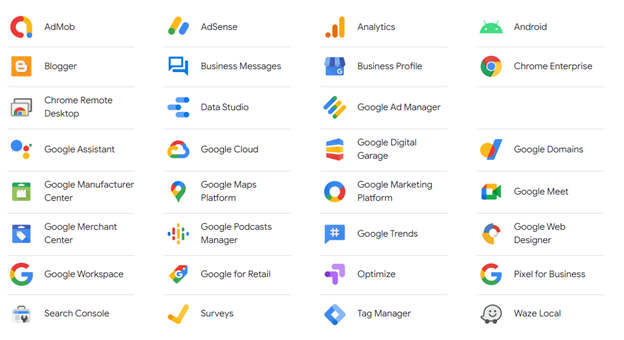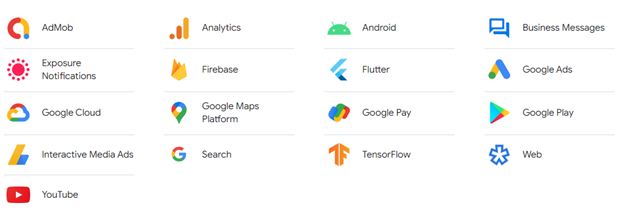Google vs. Microsoft for Businesses: A Full Comparison
September 29th, 2022 | 5 min. read
%20(46).jpg)
Choosing between the two business tool powerhouses, Google and Microsoft, can be overwhelming.
But one is not necessarily better than the other. Choosing between Google and Microsoft always starts with answering the question, “What do I need for my business?”.
As a Managed IT Service Provider (MSP), Intelligent Technical Solutions (ITS) has guided multiple businesses toward the best IT solutions for their needs. And in this article, we’re going to guide you through:
- Google Business Tools (products, pricing, and features)
- Microsoft Business Tools (products, pricing, and features)
- A quick comparison of Google vs. Microsoft
By the end of the article, you’ll have a clear idea of whether to use Google or Microsoft to lay the foundation of your IT infrastructure.
Google Business Tools (Products, Pricing, and Features)
Google is a vast company creating products for artificial intelligence, web applications, and computers. Most businesses will benefit from the following Google products and services:
1. Google Workspace
Google Workspace is Google’s answer to the well-known Microsoft Office packages. It’s bundled with the usual programs businesses need: Gmail, Drive, Meet, Calendar, Chat, Jamboard, Docs, Sheets, Slides, Keep, Sites, and Forms.
It’s made for companies, education providers, and nonprofits and has customizable versions of several previous Google products.
|
Business Starter $4.20/user/month |
Business Standard $9.60/user/month |
Business Plus $18.00/user/month |
|
|
|
Google Workspace (Fundamentals) for educational institutions is free, depending on your institution’s qualifications. However, if you need more than the fundamentals or are a business in need of enterprise-level support, you need to contact Google directly to get a quote.
2. Google Business Tools
Google also has products and services designed specifically for businesses. Some of these are AdMob, AdSense, Google Analytics, and Google Business Profile.

3. Google Developer Tools
Google also has a suite of developer tools that let you edit web pages in real-time, diagnose website problems quickly, and build a better website. You can find Google Ads, Exposure Notifications, Firebase, Google Webmaster, and Flutter with multiple forums for documentation for all their products and services.

Read “Pros & Cons of Migrating from Google Workspace to Microsoft 365 (2022)”
4. Google Drive (Cloud Storage)
Lastly, Google provides a Cloud storage option called Google Drive. It’s easily streamlined with other Google Workspace applications, such as Gmail, and has an option for desktop accessibility. However, it’s predominantly web-based and designed for in-browser functionality.
It’s easily used for collaboration and designed for users with straightforward cloud storage needs. There are multiple tools designed to facilitate conversations and brainstorming between internal and external team members. In addition, Google Drive has the capacity of 30GB/user, 5TB/user, or unlimited data storage, depending on the plan. However, it lacks the security and customization features offered by Microsoft OneDrive.
Microsoft for Businesses (Products, Pricing, and Features)
Microsoft changed the landscape of technology. The desktop you own is probably running on a Windows OS. (If not, you’ve definitely come across a Windows system.) So, does this mean you should stick with Microsoft for your company?
Here are some essential services Microsoft provides for businesses:
1. Microsoft 365
Microsoft 365 is Microsoft’s modern spin on the classic Microsoft productivity offering. It’s bundled with well-known services like Word, Excel, PowerPoint, Teams, Outlook, Exchange, OneDrive, and SharePoint.
|
Business Basic $3/user/month |
Apps for Business $8.25/user/month |
Business Standard $10/user/month |
Business Premium $22/user/month |
|
|
|
|
Like Google, if you want Microsoft Enterprise-level support, you need to contact Microsoft directly to ask for a quotation of their plans.
2. Microsoft Business Tools
While Google has a premium on the regular consumer, most large companies have products and services created by Microsoft. Microsoft designs its products specifically with businesses in mind. Some software built for businesses are Azure, Dynamics 365, Power BI, and Skype.
But one clear advantage of Microsoft is its security offerings. They have products such as Antivirus for Windows, Microsoft Security Essentials, and Microsoft Defender, which do not have a Google equivalent as these are designed for Windows OS.
Read: “Microsoft Power BI vs. Tableau (Pros & Cons)”
3. Microsoft Developer Tools
Microsoft has a thriving developer community with in-depth documentation for developers. Some of the tools for developers are Exchange, Microsoft 365, Microsoft Graph, Microsoft Graph Dev Center, SQL, System Center, Visual Studio, Windows Dev Center, and more.
4. Microsoft OneDrive (Cloud Storage)
OneDrive is Microsoft’s Cloud Storage option geared towards backing up files and making them easily accessible anywhere. However, it’s not as easy to collaborate on OneDrive compared to Google Drive due to the emphasis on security and storage of files on individual accounts.
However, those same security features make it an ideal choice for collaborating with people outside the organization. It is also bundled with other products; instead of focusing only on larger storage capacity, it leverages other products to provide a more holistic solution for your business.
At a Glance: Google vs. Microsoft
|
|
|
|
MICROSOFT |
|
1 |
Industries |
Artificial intelligence Advertising Cloud computing Computer software Computer hardware Internet |
Software development Computer hardware Consumer electronics Social networking service Cloud computing Video games Internet Corporate venture capital |
|
2 |
Specialty |
Has fundamental products for businesses and takes advantage of the web for their products |
Has more products and takes advantage of the Microsoft Digital Ecosystem to integrate their products |
|
3 |
Target Base |
Adaptable for small businesses to enterprise owners |
Adaptable for small businesses to enterprise owners |
|
5 |
Suite |
Google Workspace |
Microsoft Office 365 |
|
6 |
Focus |
Primarily Software as a Service (Saas), with apps available for the desktop |
Primarily desktop-based but with multiple Software as a Service (SaaS) web-based/web-hosted products |
|
7 |
Suite Pricing (Per User/Per Month)
|
Google Workspace Pricing Business Starter: $4.20 Business Standard: $9.60 Business Plus: $18.00 *Enterprise Plan via quotation |
Microsoft Office 365 Pricing Business Basic- $3 Apps for Business - $8.25 Business Standard - $10 Business Premium - $22 * Enterprise Plan via quotation |
|
8 |
Cloud Storage |
Google Drive |
Microsoft OneDrive |
|
9 |
Cloud Pricing (Per User/Per Month) |
Google Drive Pricing 100GB: $2 200GB: $3 2TB: $1010TB: $100 a month 20TB: $200 a month 30TB: $300 a month |
Microsoft OneDrive Pricing 1 TB: $5.00 1TB w/ Office Apps & Security Features: $10.00 1 TB per user w/ Office Apps & Web-based Apps: $6.00 1 TB per user w/ Office, Web, and Desktop Apps: $12.50 |
|
VERDICT:
|
Better for collaboration, ease of use, and businesses with basic IT needs |
Better for overall security set-ups, detailed dashboards, and data processing, and growth-centered businesses |
|
So, Google or Microsoft for Your Business?
Microsoft is for you if you want complete desktop support, to keep everything in one digital ecosystem, and to have more control over security and data management.
If you want an easily accessible, collaborative system and have no heavy security requirements, Google is a better choice for your business.
But there’s more to setting up an excellent IT infrastructure than choosing your digital ecosystem. At ITS, we ensure our clients know everything to create a sustainable, successful, and cost-efficient IT network.
Schedule a meeting with our IT experts by filling out the form below if you want immediate, tailored advice on which one you should choose for your business.
Kharmela Mindanao is a senior content writer for Intelligent Technical Solutions. She’s called Ella by her friends and likes yoga, literature, and mountain climbing. Her favorite book is Anxious People by Fredrik Backman. She creates art and poetry and is on a quest to find the best cheesecake.
Topics:
